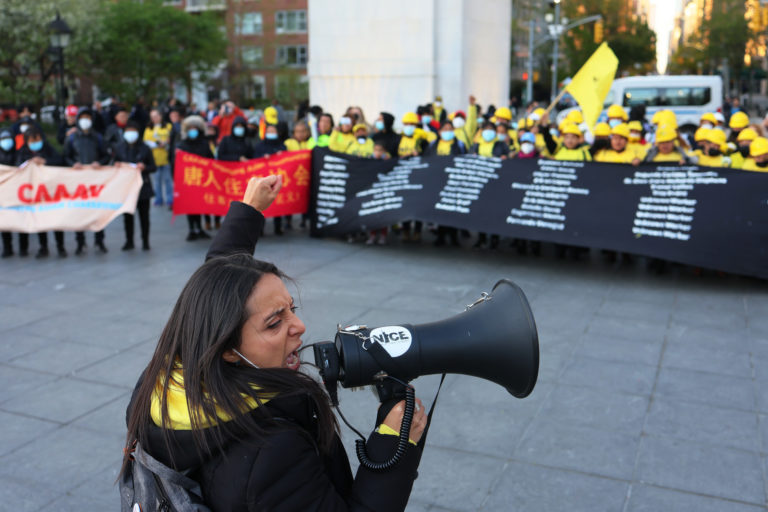
Andrew Strom is a union lawyer based in New York City. He is also an adjunct professor at Brooklyn Law School.
Donald Trump’s appointees on the National Labor Relations Board seem to have come to the conclusion that he’s going to be a one-term President, so they are racing as fast as they can to chip away at workers’ rights. A couple of weeks ago I wrote a post nominating Bexar County Performing Arts Center Foundation as the worst Trump NLRB decision yet, but since then they have a issued a flurry of new decisions that are equally outrageous. The decisions are coming so quickly that it’s hard to keep up, but I’m hoping to write a series of short posts about these aggressive moves by the NLRB.
I’m going to start with the Board’s recent decision on a procedural motion in 800 River Road Operating Corp., because it has received little attention so far, and it highlights everything that’s wrong with the Trump Board. 800 River Road should have been a routine case. The ALJ had found that the employer had committed a series of different unfair labor practices. These violations included firing one worker and suspending three other workers without providing the union notice and an opportunity to bargain over the discipline. The employer’s actions were unlawful based on the Board’s 2016 decision in Total Security Management. All you need to know about Total Security is that it was decided in 2016 – in other words, while President Obama was in office. Like the rest of the Trump Administration, the Trump appointees at the NLRB seem single-mindedly devoted to overturning every action taken during the Obama Administration.
In case the management bar couldn’t have guessed that the Trump appointees have been looking for a case to overrule Total Security, the Board Members have broadcast their intentions. Last year, in a case where the Board found that there was no duty to bargain under Total Security, Board Members Kaplan and Emanuel inserted a footnote stating that they “express no opinion whether Total Security was correctly decided.” This type of footnote (a standard feature of the Trump Board) serves no valid purpose. Instead, it was simply a thinly veiled message that the two Board Members were awaiting their opportunity to overrule Total Security.
Not only have the Trump Board members indicated that they do not endorse Total Security, but the Trump-appointed NLRB General Counsel, Peter Robb, has also urged the Board to overrule Total Security. In 800 River Road, the General Counsel’s office switched its position after the ALJ issued his decision, and joined the employer in arguing that the Board should overrule Total Security. This led the Union to take a closer look at the facts in the case. The Union found that the workers who were fired or suspended had engaged in misconduct, and thus, they would not be entitled to reinstatement or backpay. As a result, the Union filed a motion for partial withdrawal of its charge. The union’s motion should have been granted as a matter of course. Since the General Counsel had already taken a position that was adverse to the workers, once the Union asked to withdraw the charge, there was no longer a live dispute over this issue. But, in a shocking decision, the Board denied the Union’s motion.
The Board offered three reasons for denying the motion: (1) the parties have already expended resources litigating the case; (2) the motion only seeks withdrawal of part of the charge; and (3) the case presents the Board with an opportunity to address significant issue of law. The first two reasons do not withstand scrutiny. As Board Member McFerran explained, by this standard “the Board should never permit withdrawal of a charge once a case has reached the Board, and it should never permit resolution of only part of a case.” But, previously the Board has allowed withdrawal in these exact circumstances, noting that withdrawal would preserve the agency’s resources both in deciding the issue and in defending the decision on appeal. No doubt, the third reason was the real impetus for denying the motion. And, this is the real problem.
As an administrative agency, the NLRB can act either through rulemaking or through adjudication. Before issuing a substantive rule, an agency is supposed to provide notice to the public and allow for comment from interested parties. The notice and comment process takes time – the Board published its proposed joint employer rule a year ago, and it still hasn’t issued its final rule. Rulemaking also requires staff to sift through the public comments and summarize them. And, the agency must address those comments in its final rule. Throughout its history, the Board has rarely issued substantive regulations. Instead, it has shaped labor law by ruling on the controversies that workers, unions, and employers have presented to it. This focus on adjudication has lent stability to the law because new Board Members can’t simply come into office and implement new policies. Throughout the Obama years, employers benefitted from this restraint because the Obama appointees did not have occasion to revisit some of the pro-employer rulings issued by the Bush Board. But, now, in 800 River Road, the Trump majority says that there is no “case or controversy” requirement for the Board to engage in adjudication. In other words, there is no need for a live dispute or even for adverse parties. This decision is part of a pattern displayed from the moment the Trump Board Members took office. They have repeatedly reached out to decide issues that weren’t raised by the parties, and as a result they have decided important questions without even seeking briefing by the parties, let alone the wider public. The good news is that the Trump Board is running out of time. But, the bad news is that as long as they remain in office they seem willing to trample over all established norms in their zeal to hand employers as many victories as possible.










Daily News & Commentary
Start your day with our roundup of the latest labor developments. See all
January 27
NYC's new delivery-app tipping law takes effect; 31,000 Kaiser Permanente nurses and healthcare workers go on strike; the NJ Appellate Division revives Atlantic City casino workers’ lawsuit challenging the state’s casino smoking exemption.
January 26
Unions mourn Alex Pretti, EEOC concentrates power, courts decide reach of EFAA.
January 25
Uber and Lyft face class actions against “women preference” matching, Virginia home healthcare workers push for a collective bargaining bill, and the NLRB launches a new intake protocol.
January 22
Hyundai’s labor union warns against the introduction of humanoid robots; Oregon and California trades unions take different paths to advocate for union jobs.
January 20
In today’s news and commentary, SEIU advocates for a wealth tax, the DOL gets a budget increase, and the NLRB struggles with its workforce. The SEIU United Healthcare Workers West is advancing a California ballot initiative to impose a one-time 5% tax on personal wealth above $1 billion, aiming to raise funds for the state’s […]
January 19
Department of Education pauses wage garnishment; Valero Energy announces layoffs; Labor Department wins back wages for healthcare workers.